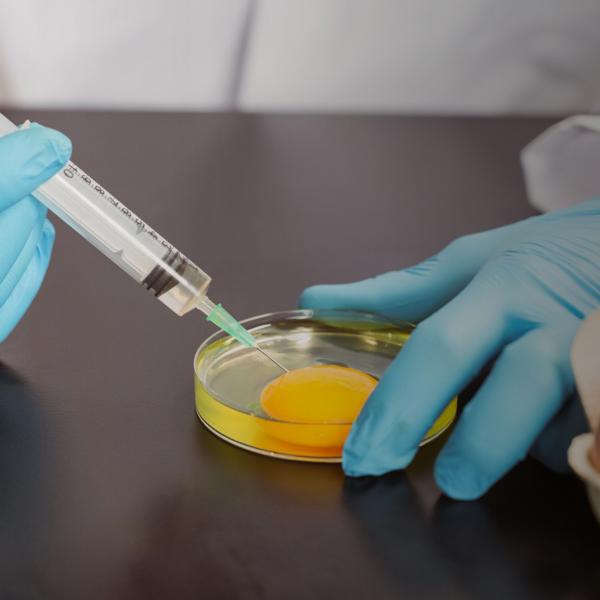CAS: 9035-81-8 | EC No.: 232-906-9
Comprising 11% of the egg white, OVOMUCOID (gene name: SPINK7) protects the developing chick from bacterial growth by inhibiting proteases. This heat and acid-stable protein comprises 186 amino acids, which bind to trypsin in a 1:1 ratio. Most avian egg whites contain significant OVOMUCOID, also known as trypsin inhibitor. Chicken OVOMUCOID does not impact chymotrypsin activity but completely inhibits trypsin. OVOMUCOID, found in hen's eggs, consists of approximately 186 amino acid residues and has a high degree of glycosylation. It features three consecutive domains that share structural similarities with the pancreatic trypsin inhibitor. OVOMUCOID is known to have strong immunogenic properties and is believed to be the primary cause of egg allergy in most cases (Allergen Gal d I).
For sensitive tissue and cell culture techniques,
OVOMUCOID is an alternative to serum-based inhibition of proteases, including trypsin and papain. Produced non-invasively, OVOMUCOID is the ethically preferred option for FBS/FCS (fetal bovine/calf serum).
Recent studies examining peptide fragments arising from the proteolytic digestion of OVOMUCOID have revealed promising functionalities. Hydrolysis using proteases, including pepsin and alcalase, yielded fragments with potential antioxidant, iron-chelating, and ACE-inhibitory properties 2,3. However, whether these peptide fragments are generated physiologically in the human gastrointestinal tract remains to be understood.
OVOMUCOID, through the p53 pathway, functions as a tumor suppressor, exerting inhibitory effects on tumor progression. The p53 protein, known for regulating cell growth and preventing abnormal cell proliferation, undergoes functional loss upon mutation, leading to tumor development. In various cancers, including oral squamous cell carcinoma (OSCC), SPINK7 expression is downregulated, while p53, RB, NF-κB, and CYP4B1 expression is upregulated. SPINK7, HER2, p53, and RB1 expression alterations can be utilized for molecular staging of OSCC lesions, distinguishing between aggressive and less aggressive forms4 Hence, SPINK7 represents a potential molecular target in tumor biotherapy strategies.
Applications:
OVOMUCOID functions effectively as a trypsin inhibitor. Applications include cell harvesting and tissue dissociation, as well as those in food and protein science. As opposed to other trypsin inhibitors, such as fetal calf serum, which is invasively extracted, OVOMUCOID is obtained from hen egg white using conventional purification methods that retain OVOMUCOID natural and potent anti-tryptic activity.
ImmunoAssays:
ELISA, Western Blot, SDS-PAGE
Protein Purification:
OVOMUCOID’s potent trypsin-inhibiting action is routinely used to prevent protein degradation during protein isolation and purification. This binding property makes OVOMUCOID suitable as a ligand for affinity purification of trypsin after immobilization onto a matrix.
Food Processing:
Food processing methods that rely on trypsin-based hydrolysis benefit from OVOMUCOID’s inhibiting properties, which can be used to prevent over-hydrolysis.
Cell and Tissue Culture:
OVOMUCOID is an ideal alternative to serum-based trypsin inhibition methods. Inhibiting solutions containing OVOMUCOID are recommended for use in cell dissociation and cell lifting applications for broad cell types, including sensitive primary cells, stem cells, and organoids. OVOMUCOID can also be applied as a protease inhibitor in enzymatic antigen-retrieval protocols using papain or trypsin proteases.
Oncological Research:
The SPINK (serine protease inhibitor Kazal type) family comprises SPINK1-14, the largest subgroup within the serine protease inhibitor family. SPINK proteins play crucial roles in pancreatic physiology and diseases, sperm maturation and capacitation, Nager syndrome, inflammation, and maintaining the integrity of the skin barrier. Extensive evidence suggests that dysregulated expression of SPINK1, 2, 4, 5, 6, 7, and 13 is closely associated with various human tumors. Different SPINK proteins exhibit diverse regulatory patterns in different types of cancer, thereby serving as valuable prognostic markers.
SPINKs play a crucial role in maintaining the balance of protease activity by regulating serine proteases. They are believed to prevent enzyme overactivity in the pancreas, reducing the risk of pancreatitis. When SPINKs and trypsin are incubated together, they form a stable yet reversible interaction through the formation of a covalent bond between the active lysine carboxyl group of SPINKs and the catalytic serine residue of trypsin (16). This interaction temporarily inhibits trypsin activity, ensuring that it can be reactivated in the intestine to support the process of digestion5.
Advantages & benefits:
As one of the largest producers and suppliers of egg-derived proteins, including OVOMUCOID, Bioseutica® is the trusted source for the highest purity of egg proteins. We offer a full range of services, including technical and application support, working with our customers to tailor products to their unique specifications. Our quality control procedures ensure consistency of quality across production runs. We offer and encourage our customers to review the analytical results of our production runs and pre-shipment samples for in-house approval.
Regulatory:
Regulations may vary by country. Always check the local legislation regarding the usage and claims of this product.
References:
- Jochems C et al.The Use of Fetal Bovine Serum: Ethical or Scientific Problem? | Publisher Site
- Abeyrathne E et al.: Enzymatic hydrolysis of OVOMUCOID and the functional properties of its hydrolysates | Publisher Site
- Ding L et al.: Transport of Egg White ACE-Inhibitory Peptide, Gln-Ile-Gly-Leu-Phe, in Human Intestinal Caco‐2 Cell Monolayers with Cytoprotective Effect | Publisher Site
- Pennacchiotti G., Valdés-Gutiérrez F., González-Arriagada W.A.et al.:SPINK7 expression changes accompanied by HER2, P53, and RB1 can be relevant in predicting oral squamous cell carcinoma at a molecular level | Publisher Site
- C. Liao, Q. Wang, J. An, M. Zhang, J. Chen, X Li, L. Xiao, J. Wang, Q. Long, J.Liu, and X. Guan: SPINKs in Tumors: Potential Therapeutic Targets | Publisher Site

